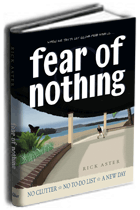When people are coming to visit, hosts often worry about making a good impression on their visitors. The situation, though, is also an opportunity to save time for everyone involved by making things more convenient for the visitors.
December 28, 2011
December 17, 2011
Don’t Get Things Out Early
When you’re getting ready to work on a project, like baking a pie for a Christmas party, it seems as if you can save time by getting the materials out in advance. You know you need to bake the pie tomorrow, so you put the flour, pie pan, rolling pin, and all the other things you’ll need out on the table. Then, you think, when you’re ready to start on the pie, all you need to do is show up and start baking.
This doesn’t work nearly as well as it seems it should. It ends up taking more time when you try to save time this way.
December 08, 2011
Deadlines: Don’t Wait Until the Last Minute
Time pressure and deadlines go together, particularly as a deadline approaches. If the last-minute efforts that go along with wrestling with deadlines are a source of stress, you can make your life easier by changing the way you think of deadlines.
December 03, 2011
Making Email Less Alarming
After email becomes a habit, you can stop noticing how intrusive it is. Most email programs automatically check for new email every minute, and they sound an alarm whenever a new message comes in.
An alarm! Every minute! That’s appropriate, of course, if you’re receiving email messages about fires that you have to go put out. But if you’re not working at the fire house, you can easily take steps to make email less alarming. This can save you time and can make life noticeably less stressful.
December 02, 2011
The Psychology of Busy
Chris Brogan today writes, “You’re Not As Busy As You Think.” “Busy,” Brogan suggests, could be a psychological pattern of avoiding some things (“all the tasks I can’t seem to master in life, like paying bills on time”) or seeking other things in ways that may not be so practical and may not even be consciously acknowledged (visibility and feedback are two things we may spend time seeking without any particular purpose in mind).
In economic theory, the way to be less busy is to drop work on low-priority objectives. This requires recognizing the low-priority objectives in your work, which is not always easily done. Brogan suggests that you look at the things you do over and over again, and “Ask yourself quite honestly what purpose this activity serves.”
December is the busiest month for many people, and most of the time pressure that people face is unnecessary. During December I’ll be offering several ideas of simple ways to be less busy.


